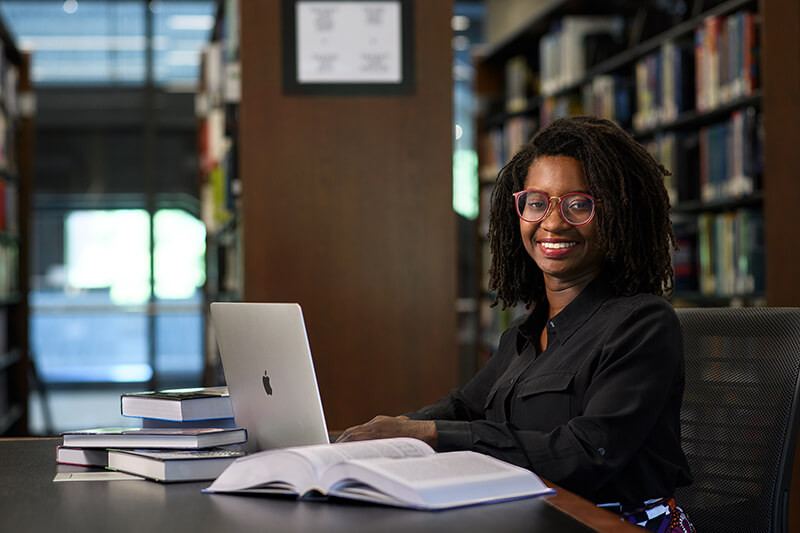July 8, 2020
COVID-19 ‘toolkit’ helps health care providers stay informed
 Bethany McGowan, an assistant professor and health sciences information specialist at Purdue University, is partnering with the nonprofit organization Evidence Aid to develop a toolkit dedicated to help healthcare providers during COVID-19. The toolkit is a collection of short synopses of systematic reviews. A systematic review can be best described as a collection of studies and evidence in response to a research question. (Purdue University/Rebecca McElhoe)
Download image
Bethany McGowan, an assistant professor and health sciences information specialist at Purdue University, is partnering with the nonprofit organization Evidence Aid to develop a toolkit dedicated to help healthcare providers during COVID-19. The toolkit is a collection of short synopses of systematic reviews. A systematic review can be best described as a collection of studies and evidence in response to a research question. (Purdue University/Rebecca McElhoe)
Download image
WEST LAFAYETTE, Ind. — As researchers learn more about COVID-19 and its effect on human health, the need for that information to be accessed – and understood – quickly and easily is vital.
Bethany McGowan, an assistant professor and health sciences information specialist at Purdue University, is partnering with the nonprofit organization Evidence Aid to develop a toolkit dedicated to help health care providers during COVID-19.
“The scope of content that is relevant to COVID-19 treatment and response is bigger than any of us could have imagined,” McGowan says. “My goal is to highlight existing information and help people who need that information find it quickly and as efficiently as possible.”
The toolkit is a collection of short synopses of systematic reviews. A systematic review can be best described as a collection of studies and evidence in response to a research question.
“We want to look at how doctors can respond to and treat COVID-19,” McGowan says. “We provide quick summaries so clinicians and policymakers can get a sense of how the virus is affecting us and how to proceed with future decisions.”
Currently, the COVID-19 Toolkit includes nearly 300 systematic review summaries on topics. Included are treatment of affected individuals, diagnostics and epidemiology, health and social care, preventing infection and transmission, and social consequences of pandemic. McGowan expects the toolkit to keep growing as health care workers are posed with more questions. So far, more than 100,000 visitors have accessed the website.
“There are hard questions that still need to be answered, and more will come up as time goes on,” McGowan says. “Questions such as how should be people be tracked, tracking people to see if they are contagious, and whether or not people are capable of having the virus a second time are some of those hard questions being asked right now. Our frontline workers need information readily available to them to help find those answers.”
The COVID-19 toolkit team consists of 63 volunteers from 16 countries, including summary writers, screeners, information specialists, project managers, and web designers. The work is in collaboration with the World Health Organization, Public Health England, the Pan American Health Organization, Cochrane, the Campbell Collaboration, the Global Health Programme Director, and Oxford PharmaGenesis to extend global reach.
McGowan also wants to remind anyone accessing the toolkit that the information doesn’t stop at the summaries themselves.
“If someone finds the information we’ve included to be useful, I would encourage them to look at the research in its entirety,” McGowan says. “I’m envisioning that this project will continue as long as the need is there.”
About Purdue University
Purdue University is a top public research institution developing practical solutions to today’s toughest challenges. Ranked the No. 6 Most Innovative University in the United States by U.S. News & World Report, Purdue delivers world-changing research and out-of-this-world discovery. Committed to hands-on and online, real-world learning, Purdue offers a transformative education to all. Committed to affordability and accessibility, Purdue has frozen tuition and most fees at 2012-13 levels, enabling more students than ever to graduate debt-free. See how Purdue never stops in the persistent pursuit of the next giant leap at purdue.edu.
Writer: Abbey Nickel, nickela@purdue.edu
Media contact: Amy Patterson Neubert, apatterson@purdue.edu
Source: Bethany McGowan, bmcgowa@purdue.edu
Journalists visiting campus: Journalists should follow Protect Purdue protocols and the following guidelines:
- Campus is open, but the number of people in spaces may be limited. We will be as accommodating as possible, but you may be asked to step out or report from another location.
- To enable access, particularly to campus buildings, we recommend you contact the Purdue News Service media contact listed on the release to let them know the nature of the visit and where you will be visiting. A News Service representative can facilitate safe access and may escort you on campus.
- Wear face masks inside any campus building. Wear face masks outdoors when social distancing of at least six feet is not possible.
Note to Journalist: A photo of Bethany McGowan is available for media to use via a Google Drive folder.

